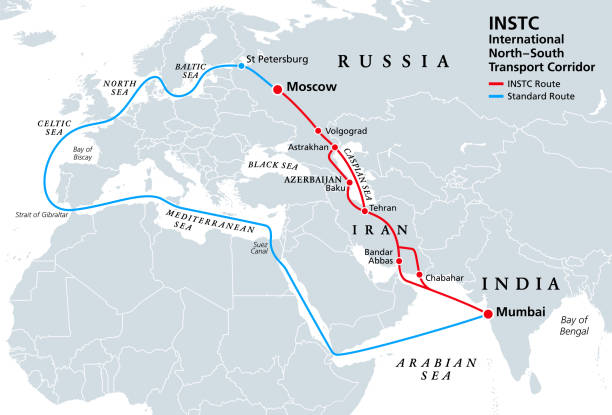US cancels Chabahar port sanctions exemption in blow to India's regional strategy

The United States has terminated a 2018 sanctions waiver for Iran's Chabahar port, taking effect September 29, creating significant challege for India's strategy in the region.
The Chabahar facility, constructed by India along Iran's southeastern coastline, forms a crucial element of the International North-South Transport Corridor (INSTC) and the proposed India-Middle East-Europe Economic Corridor. These transport networks aim to boost India's commercial and strategic reach across Central Asia whilst circumventing Pakistan and providing an alternative to China's Belt and Road Initiative (BRI).
The State Department quietly announced on September 16 that it was terminating the sanctions exemption provided under the Biden-era Iran Freedom and Counter-Proliferation Act as part of Washington's strategy to target Iran officially. However, the timing coincides with the Trump administration's efforts to pressure India to cease purchasing Russian oil, IntelliNews has learned.
“Consistent with President Trump’s maximum pressure policy to isolate the Iranian regime, the Secretary of State has revoked the sanctions exception issued in 2018 under the Iran Freedom and Counter-Proliferation Act (IFCA) for Afghanistan reconstruction assistance and economic development, effective September 29, 2025,” the US State Department said, adding “Once the revocation is effective, persons who operate the Chabahar Port or engage in other activities described in IFCA may expose themselves to sanctions under IFCA.”

In theory, India secured a long-term lease to operate a terminal at Chabahar, which provides trade access to Afghanistan and Central Asia without relying on Pakistani routes. However, in practice, despite successive Iranian administrations' repeated complaints that New Delhi has not fulfilled its commitments to finish the port developments, both nations have maintained cooperation, hoping that sanctions against Tehran would eventually be lifted to enable broader regional trade.
The facility developed through collaboration between Indian Ports Global Limited and Iran's Port & Maritime Organisation should by now be a major transport hub, seeing as it connects to Central Asia, Turkey and the Caucasus. Still, in theory, the port has become a victim of the wider low-level cold war between Tehran and Washington since its inception. India has repeatedly tried to create a sanctions carve-out, but has been achingly slow in actually doing anything not to irk the US, according to Iranian officials behind closed doors on multiple occasions.
However, the September 16 waiver cancellation heightens the possibility of India facing further American sanctions for its participation in the port's development and management. As trade had been minimal between Iran and India already, this carve-out removal is a clear message to India that it will be targeted explicitly until it plays ball with the Trump administration.
Relations between Washington and New Delhi have already deteriorated in recent months, with India remaining among the largest purchasers of Russian oil despite the Trump administration's attempts to reduce such dependency. Prime Minister Modi's recent public appearances alongside Russian President Vladimir Putin and Chinese leader Xi Jinping at the Shanghai Cooperation Organisation (SCO) meeting further strained ties with the White House. However, Trump claimed to have spoken with the Indian leader on September 18 in the UK in his Chequers press conference with Keir Starmer.
Despite the press in India kicking up a storm over the quiet removal of exemptions, the Foreign Ministry in Tehran has yet to respond to the tightening of measures against its wider regional connectivity projects, with a government minister on September 19 referencing Chabahar as part of the country's wider regional trade matrix. That comment likely signals that either Tehran has not quite understood what has happened at a top level or it has become India's problem.
In May last year, during the signing ceremony, Indian Ports, Shipping and Waterways Minister Sarbananda Sonowal said India would make the maximum effort to develop the Chabahar port further. Since then, it has done the minimal, according to locals in Chabahar.
"Today we are taking a historic step between Iran and India, considering the historical relations of the two countries," Sonowal said at the time, noting that a previous agreement was signed in 2016 and the new long-term contract demonstrates trust between the two nations.
Former Ports and Maritime Organisation of Iran Managing Director Ali-Akbar Safaei said the agreement represented the determination of senior officials from both countries to bring one of the most important port and maritime projects to fruition, eghtesadonline reported on September 19.
On May 16, 2024, the US State Department Deputy Spokesperson expressed concern about the 10-year Iran-India agreement, stating that American sanctions against Iran remain in place and Washington will continue implementing them.
"Any entity considering commercial engagement with Iran needs to be aware of the potential risks they are opening themselves up to and the potential risks of sanctions," the spokesperson said.
How New Delhi now responds to this blatant targeting of Indian interests in West Asia is now anyone's guess; however, with Modi, Xi, and Putin looking very friendly at the SCO, we are likely to see a broadening rejection of adherence to US diktats across the region. The winner is potentially Tehran after over a decade of waiting for development.
Donald Trump, however, is no shrinking violet. If he sees this as a direct challenge to American Hegemony in the Indian Ocean, then the world could see a cranking up of US sanctions on India, the world's most populous country.
Unlock premium news, Start your free trial today.



